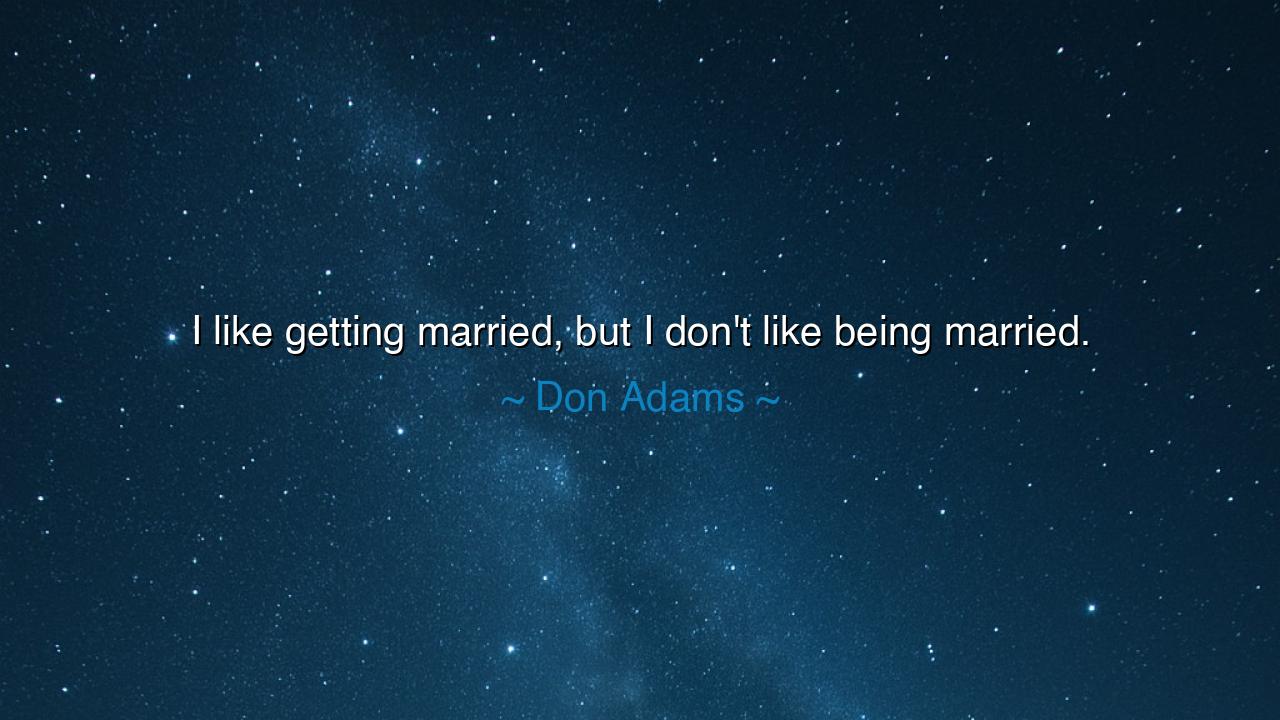
I like getting married, but I don't like being married.






The words of Don Adams, spoken with wit yet tinged with melancholy, hold a truth that many have felt but few have dared to name: “I like getting married, but I don’t like being married.”
Though brief and humorous, this phrase contains a mirror to human nature — that strange longing for beginnings, for the fire and thrill of the new, and the equal fear of what follows: the endurance of the everyday. In Adams’s jest lies an ancient wisdom, the realization that the joy of union is often easier to celebrate than the quiet labor of companionship. It is easy to love the music of the wedding feast, but much harder to dance gracefully to the rhythm of ordinary days.
Don Adams, the famed actor and comedian best known for his role in Get Smart, lived in the glare of laughter and applause. Yet even in that world of charm and performance, he glimpsed what many discover behind closed doors — that marriage is not sustained by ceremony, but by constancy. To “like getting married” is to love the spectacle — the promise, the romance, the illusion of perfection. But to “not like being married” is to feel the weight of what comes after: the compromises, the patience, the daily choosing of another person even when the music has faded. His words, though delivered with humor, reveal the quiet sorrow of all who find that love’s truest test begins after the celebration ends.
The ancients understood this well. They spoke of love not as mere passion, but as a discipline of the soul. The philosopher Socrates said that marriage was like a public test — to endure it with grace was to gain wisdom. For passion burns swiftly, but devotion is forged slowly, in the forge of time. Adams’s lament reminds us that many seek the warmth of love without wishing to bear its weight. They crave the poetry of the vow but not the prose of daily life — yet both are needed if love is to endure. The wedding is a promise made with the heart; the marriage is that promise kept with the will.
Consider the story of King Henry VIII, whose restless pursuit of romance led him to six wives, each union beginning in passion and ending in tragedy. He was a man who loved the idea of marriage — the conquest, the ceremony, the exalted moment of love — but could not abide the constancy it required. In him we see the warning within Adams’s humor: that to love the beginning more than the journey is to doom oneself to endless dissatisfaction. The dream of love must be followed by the discipline of love, else it turns to ash.
Yet, there is compassion in this truth. To “not like being married” does not make one wicked, but human. The heart seeks novelty; the spirit hungers for freedom. What we must learn, as Adams perhaps did too late, is that love does not chain freedom — it refines it. True marriage is not the loss of self, but the deepening of it through shared purpose. To remain in love, one must transform the thrill of beginning into the art of renewal, learning to find wonder not only in the first kiss but in the thousandth shared silence.
Let this be the lesson, then, passed down to all who dream of love: do not mistake the spark for the fire. The wedding is a beautiful illusion, a doorway; marriage is the long road beyond it. The joy of union lies not in its beginning, but in its endurance — in the courage to grow beside another soul, through storms and stillness alike. To love truly is not to chase the endless dawn of romance, but to build a sun that rises anew each day.
So, my child, if you seek love, do not seek it for the excitement of being married, but for the wisdom of remaining so. Rejoice in beginnings, but honor the journey. Let patience be your passion, humor your shield, forgiveness your daily bread. For love, when tended with care, transforms the ordinary into the sacred — and then, even the quiet hours of marriage become the most beautiful adventure of all.






AAdministratorAdministrator
Welcome, honored guests. Please leave a comment, we will respond soon